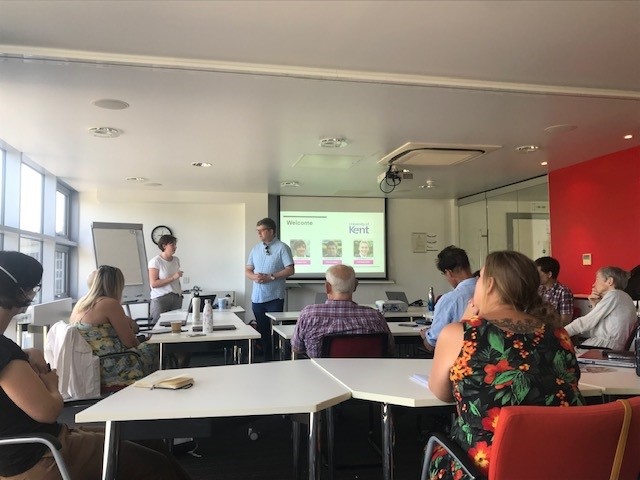From switching to reusable cups to catching public transport, we all know there are numerous ways that we can change our habits to reduce our carbon footprint. But how can businesses incentivise their staff and customers to change their behaviour to meet sustainability goals? This is what academics from the Division of Human and Social Sciences set out to advise businesses in July.
As part of the Net Zero Pathway to Change workshop series, Professor Tim Hopthrow, Dr Hannah Swift and Professor Robbie Sutton led a session exploring the psychology of behavioural change and how it can be used to explain and influence society’s response to climate change.
Prof Tim Hopthrow shared his own research as an example of how behavioural change can be achieved at a local level. In 2018-2019, he led a project with Canterbury City Council to investigate whether drivers could be persuaded by road sign messages to turn off their engines whilst waiting at a train crossing. They found that drivers responded most effectively to social norm messages (e.g. “Join other responsible drivers in Canterbury…”) and efficacy messages (“You will improve air quality in the area.”), which successfully increased the proportion of drivers who turned off their engines, by 42% and 25%, respectively.
Alongside real-life examples, the workshop introduced businesses to a range of theories, techniques and approaches which can be used to transform a problem into a solution. They also explained the APEASE criteria, used for evaluating psychological intervention strategies from several points-of-view; acceptability, practicability, effectiveness/cost-effectiveness, affordability, safety and equity.
Dr Hannah Swift, Senior Lecturer in Social and Organisational Psychology, said of the workshop, “the great thing about our workshop and approach is that it gives businesses a framework for understanding behaviour change, which can be tailored to the individual needs of each business.”
This Net Zero Pathway to Change workshop is part of a wider programme, funded by the UK Community Renewal Fund and led by Kent Invicta Chamber of Commerce, Kent County Council and the University of Kent, to support SMEs within the Local Authority areas of Swale, Gravesham and Canterbury to identify, adapt and implement measures that reduce their carbon emissions. As such, businesses from these areas who attend the workshops are able -and encouraged- to apply for £5k funding to continue to access support from University of Kent academics to take further steps towards meeting their net zero goals.

